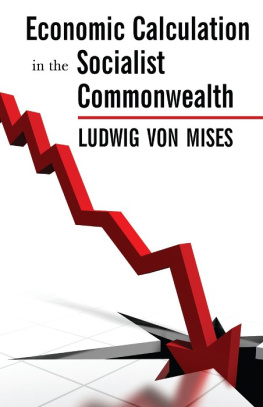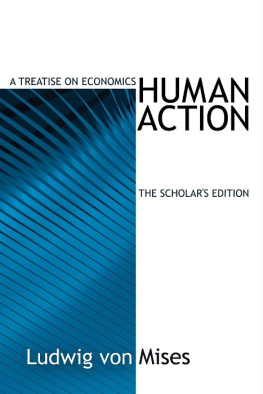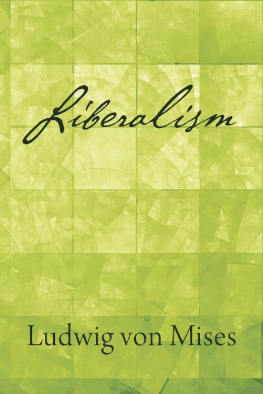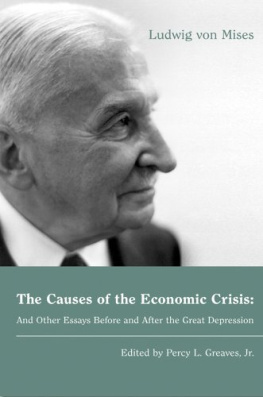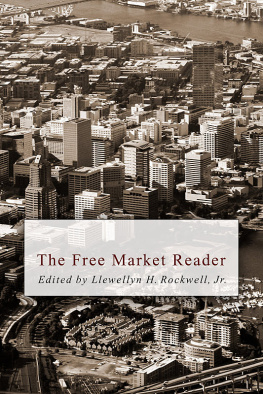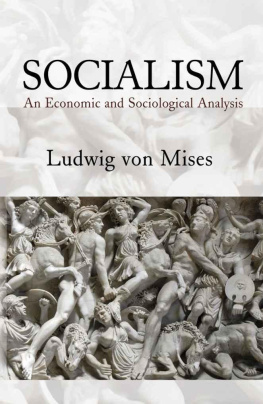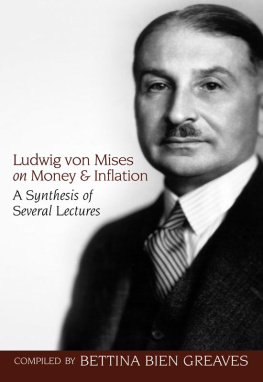Ludwig von Mises - Economic Calculation in the Socialist Commonwealth
Here you can read online Ludwig von Mises - Economic Calculation in the Socialist Commonwealth full text of the book (entire story) in english for free. Download pdf and epub, get meaning, cover and reviews about this ebook. year: 0, publisher: Ludwig von Mises Institute, genre: Politics. Description of the work, (preface) as well as reviews are available. Best literature library LitArk.com created for fans of good reading and offers a wide selection of genres:
Romance novel
Science fiction
Adventure
Detective
Science
History
Home and family
Prose
Art
Politics
Computer
Non-fiction
Religion
Business
Children
Humor
Choose a favorite category and find really read worthwhile books. Enjoy immersion in the world of imagination, feel the emotions of the characters or learn something new for yourself, make an fascinating discovery.
- Book:Economic Calculation in the Socialist Commonwealth
- Author:
- Publisher:Ludwig von Mises Institute
- Genre:
- Year:0
- Rating:5 / 5
- Favourites:Add to favourites
- Your mark:
- 100
- 1
- 2
- 3
- 4
- 5
Economic Calculation in the Socialist Commonwealth: summary, description and annotation
We offer to read an annotation, description, summary or preface (depends on what the author of the book "Economic Calculation in the Socialist Commonwealth" wrote himself). If you haven't found the necessary information about the book — write in the comments, we will try to find it.
Economic Calculation in the Socialist Commonwealth — read online for free the complete book (whole text) full work
Below is the text of the book, divided by pages. System saving the place of the last page read, allows you to conveniently read the book "Economic Calculation in the Socialist Commonwealth" online for free, without having to search again every time where you left off. Put a bookmark, and you can go to the page where you finished reading at any time.
Font size:
Interval:
Bookmark:
(translated from the German by S. Alder)
Ludwig von Misess seminal essay, originally published in 1920 appears here in the 1990 edition published by the Ludwig von Mises Institute. This article appeared originally under the title Die Wirtschaftsrechnung im sozialistischen Gemeinwesen in the Archiv fr Sozialwissenschaften, vol. 47 (1920). The present translation was first published in F.A. Hayek, ed., Collectivist Economic Planning (London: George Routledge & Sons, 1935; reprint, Clifton, N.J.: Augustus M. Kelley, 1975), pp. 87-130. Some annotations appear in this edition and they are set aside in brackets. Economic Calculation in the Socialist Commonwealth advances a devastating critique against economic calculation in a socialist economy, inspiring a decades-long debate.

There are many socialists who have never come to grips in any way with the problems of economics, and who have made no attempt at all to form for themselves any clear conception of the conditions which determine the character of human society. There are others, who have probed deeply into the economic history of the past and present, and striven, on this basis, to construct a theory of economics of the bourgeois society. They have criticized freely enough the economic structure of free society, but have consistently neglected to apply to the economics of the disputed socialist state the same caustic acumen, which they have revealed elsewhere, not always with success. Economics, as such, figures all too sparsely in the glamorous pictures painted by the Utopians. They invariably explain how, in the cloud-cuckoo lands of their fancy, roast pigeons will in some way fly into the mouths of the comrades, but they omit to show how this miracle is to take place. Where they do in fact commence to be more explicit in the domain of economics, they soon find themselves at a lossone remembers, for instance, Proudhons fantastic dreams of an exchange bankso that it is not difficult to point out their logical fallacies. When Marxism solemnly forbids its adherents to concern themselves with economic problems beyond the expropriation of the expropriators, it adopts no new principle, since the Utopians throughout their descriptions have also neglected all economic considerations, and concentrated attention solely upon painting lurid pictures of existing conditions and glowing pictures of that golden age which is the natural consequence of the New Dispensation.
Whether one regards the coming of socialism as an unavoidable result of human evolution, or considers the socialization of the means of production as the greatest blessing or the worst disaster that can befall mankind, one must at least concede, that investigation into the conditions of society organized upon a socialist basis is of value as something more than a good mental exercise, and a means of promoting political clearness and consistency of thought. In an age in which we are approaching nearer and nearer to socialism, and even, in a certain sense, are dominated by it, research into the problems of the socialist state acquires added significance for the explanation of what is going on around us. Previous analyses of the exchange economy no longer suffice for a proper understanding of social phenomena in Germany and its eastern neighbors today. Our task in this connection is to embrace within a fairly wide range the elements of socialistic society. Attempts to achieve clarity on this subject need no further justification.
Under socialism all the means of production are the property of the community. It is the community alone which can dispose of them and which determines their use in production. It goes without saying that the community will only be in a position to employ its powers of disposal through the setting up of a special body for the purpose. The structure of this body and the question of how it will articulate and represent the communal will is for us of subsidiary importance. One may assume that this last will depend upon the choice of personnel, and in cases where the power is not vested in a dictatorship, upon the majority vote of the members of the corporation.
The owner of production goods, who has manufactured consumption goods and thus becomes their owner, now has the choice of either consuming them himself or of having them consumed by others. But where the community becomes the owner of consumption goods, which it has acquired in production, such a choice will no longer obtain. It cannot itself consume; it has perforce to allow others to do so. Who is to do the consuming and what is to be consumed by each is the crux of the problem of socialist distribution.
It is characteristic of socialism that the distribution of consumption goods must be independent of the question of production and of its economic conditions. It is irreconcilable with the nature of the communal ownership of production goods that it should rely even for a part of its distribution upon the economic imputation of the yield to the particular factors of production. It is logically absurd to speak of the workers enjoying the full yield of his work, and then to subject to a separate distribution the shares of the material factors of production. For, as we shall show, it lies in the very nature of socialist production that the shares of the particular factors of production in the national dividend cannot be ascertained, and that it is impossible in fact to gauge the relationship between expenditure and income.
What basis will be chosen for the distribution of consumption goods among the individual comrades is for us a consideration of more or less secondary importance. Whether they will be apportioned according to individual needs, so that he gets most who needs most, or whether the superior man is to receive more than the inferior, or whether a strictly equal distribution is envisaged as the ideal, or whether service to the State is to be the criterion, is immaterial to the fact that, in any event, the portions will be meted out by the State.
Let us assume the simple proposition that distribution will be determined upon the principle that the State treats all its members alike; it is not difficult to conceive of a number of peculiarities such as age, sex, health, occupation, etc., according to which what each receives will be graded. Each comrade receives a bundle of coupons, redeemable within a certain period against a definite quantity of certain specified goods. And so he can eat several times a day, find permanent lodgings, occasional amusements and a new suit every now and again. Whether such provision for these needs is ample or not, will depend on the productivity of social labor.
Moreover, it is not necessary that every man should consume the whole of his portion. He may let some of it perish without consuming it; he may give it away in presents; he many even in so far as the nature of the goods permit, hoard it for future use. He can, however, also exchange some of them. The beer tippler will gladly dispose of non-alcoholic drinks allotted to him, if he can get more beer in exchange, whilst the teetotaler will be ready to give up his portion of drink if he can get other goods for it. The art lover will be willing to dispose of his cinema tickets in order the more often to hear good music; the Philistine will be quite prepared to give up the tickets which admit him to art exhibitions in return for opportunities for pleasure he more readily understands. They will all welcome exchanges. But the material of these exchanges will always be consumption goods. Production goods in a socialist commonwealth are exclusively communal; they are an inalienable property of the community, and thus
Font size:
Interval:
Bookmark:
Similar books «Economic Calculation in the Socialist Commonwealth»
Look at similar books to Economic Calculation in the Socialist Commonwealth. We have selected literature similar in name and meaning in the hope of providing readers with more options to find new, interesting, not yet read works.
Discussion, reviews of the book Economic Calculation in the Socialist Commonwealth and just readers' own opinions. Leave your comments, write what you think about the work, its meaning or the main characters. Specify what exactly you liked and what you didn't like, and why you think so.

